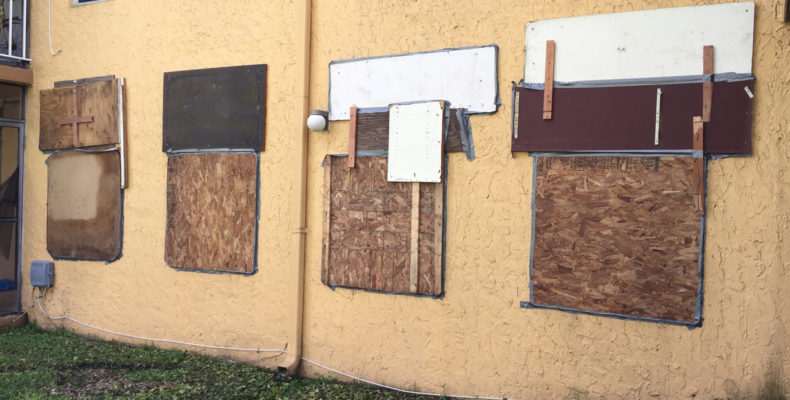Were you one of the millions of Floridians that were squandering to find plywood for storm protection prior Irma’s looming arrival? At some point, during the six hour wait in Home Depot, you probably thought to yourself “I should really look into getting better storm protection like Hurricane panels or shutters”. If you did, you were not alone. Countless residents were putting up plywood in a last minute attempt to protect themselves from Hurricane Irma’s onslaught through the Caribbean. If you were lucky, you found enough plywood to seal your doors and windows. If you were not, you had to weather the storm without any protection whatsoever. Do not let luck play a factor in keeping your family guarded. Let the Architects at Fix My Code Violation help guide you through the proper process for installing hurricane shutters, storm panels, and/or impact windows and impact doors. Although it is important to install storm protection, you should not do it without getting the proper building permits; otherwise you may be dealing with an improperly installed windows and doors, and also a building code violation. The City of Miami Building Department is keen on issuing code violations to illegal windows and doors. However, do not let the Miami building Department be a hurdle that prevents you from being prepared!
As a Floridian, there is no excuse for being unprepared for a violent hurricane. In Miami, we enjoy phenomenal conditions throughout the year, but we have to accept the good with the bad. The reality is that we live in hurricane alley, and that will never change. We can only brace ourselves for the very worst by installing hurricane shutters, storm panels, or impact resistant windows. Manufacturers that produce hurricane shutters, storm panels, or impact resistant windows products must undergo a rigorous testing and approval process in order to be purchased and installed in Florida. Miami-Dade County also requires similar, yet more extensive, testing on all items that are exposed to exterior conditions. These tests include missile tests (Large & Small Impact Resistance), and also Cyclical Tests (Wind Pressures). Furthermore, when installing hurricane protection, the Miami Building Departments requires for a window and door permit to be submitted. While undergoing the window and door permit process, an engineer or Architect will calculate the wind pressures for each fenestration in your home or business. These calculations are based on the specific size of each opening, and are verified to withstand a minimum wind velocity of 175 MPH (equal to a category 5 hurricane). In every circumstance, our staff of Architects at Fix My Code Violation calculate the wind pressure for impact windows and impact doors and specifies a product that far surpasses the minimum design and wind load pressures. By doing so, our firm guarantees that the storm protection devices will be suitable for storms that are as minimal as a tropical storm, but will also be strong enough to endure the most violent of hurricanes. Your safety is predicated on the decisions you make prior to disastrous events, and it is our duty, as Architects, to help you obtain the highest level of security.
Although it is tempting to install hurricane shutters, storm panels, or impact resistant windows without a permit, it is not in your best interest to do so. As a Miami based Architect, I encounter hundreds of window legalization and door legalizations projects where the storm protection items were installed incorrectly, which in turn negates the structural integrity and reliability for the product at hand. Purchasing and installing hurricane shutters, storm panels, or impact resistant windows is not cheap, but your money and safety will be ensured unless a city inspector verifies that the method of installation for the storm protection is done as per the manufacturer’s instructions. Although it may seem like a burden to get city approval, remember that the City of Miami and Miami-Dade County Building Department, as well as our Architect’s at Fix My Code Violation, first duty and highest obligation is public safety.


Recent Comments